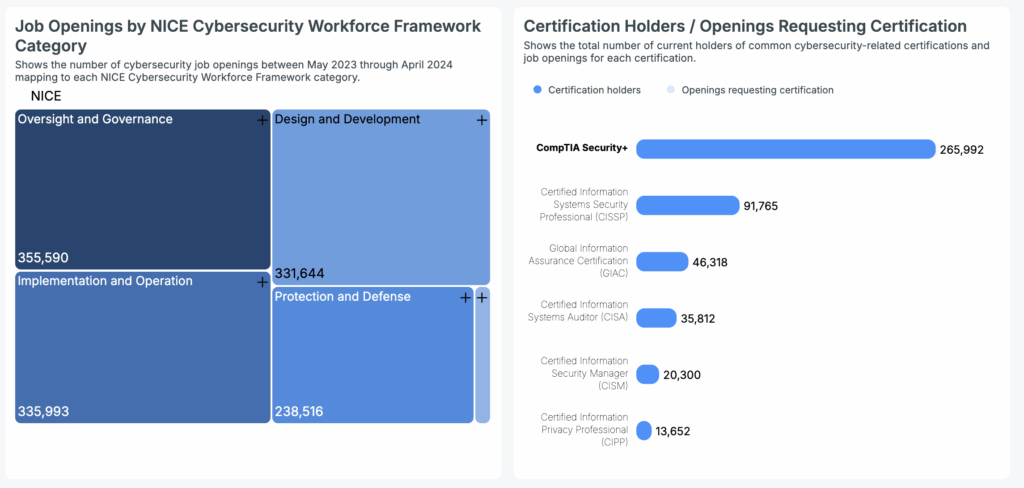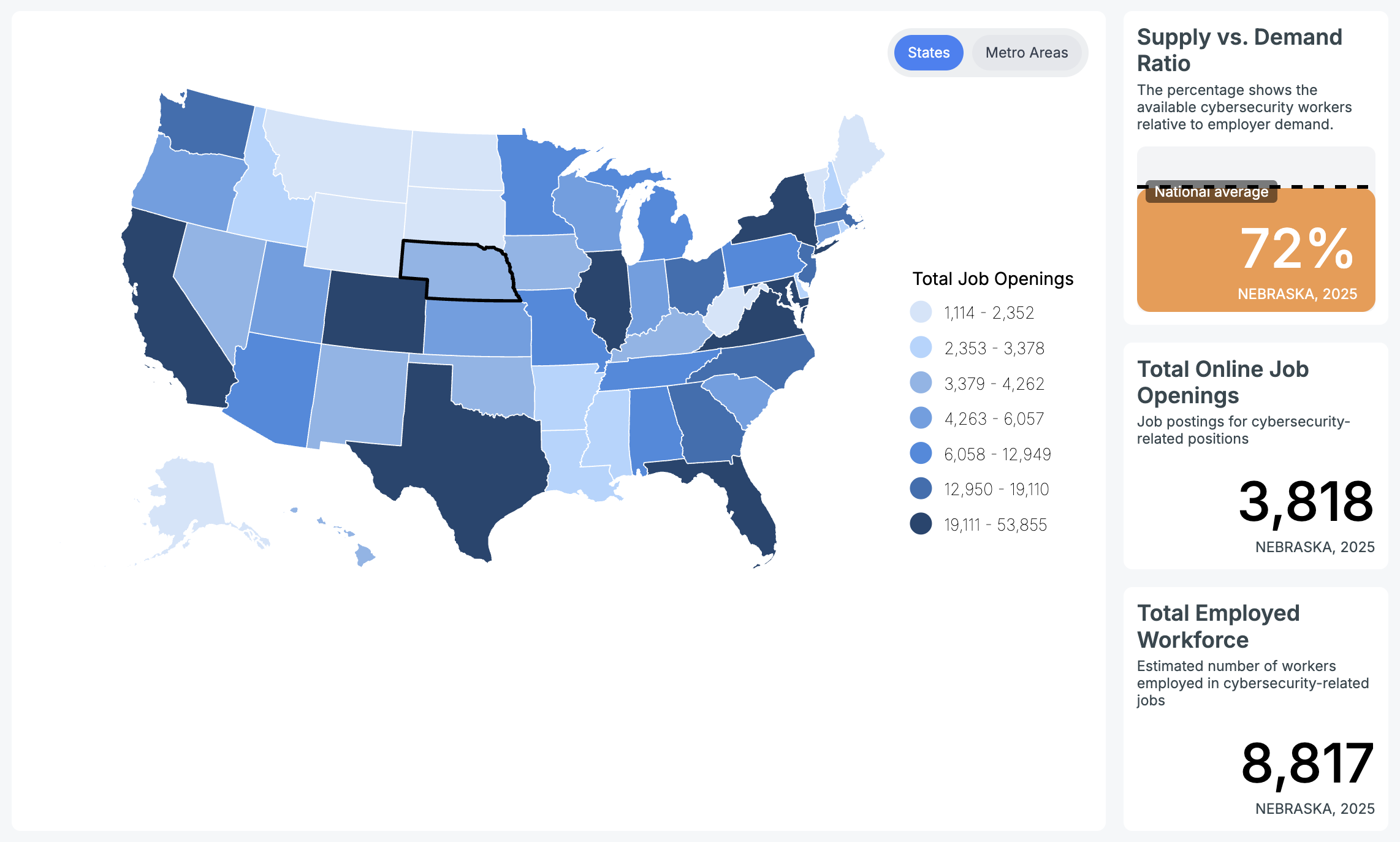- Associate degrees
- Bachelor’s degrees
- Master’s degrees
- Cybersecurity certifications
- Cybersecurity jobs
- Related resources
The following guide is a summary of cybersecurity schools in Nebraska as well as related career opportunities.
Commonly called the Cornhusker State, Nebraska has long been an important agricultural asset for the US. Its location in the heart of the Great Plains and large expanses of flat ground and gently rolling hills make it perfect for farming and ranching.
Ad
cybersecurityguide.org is an advertising-supported site. Clicking in this box will show you programs related to your search from schools that compensate us. This compensation does not influence our school rankings, resource guides, or other information published on this site.
Featured Cybersecurity Degree Programs
| School Name | Program | More Info |
|---|---|---|
| Purdue Global | Online BS in Cybersecurity | website |
| Grand Canyon University | Online BS in Cybersecurity or Online MS in Cybersecurity | website |
| UC Berkeley School of Information | Master’s in Cybersecurity | No GRE/GMAT Required | website |
| Arizona State University | Online MA in Global Security - Cybersecurity | website |
| Southern New Hampshire University | Online BS in Cybersecurity or Online MS in Cybersecurity | website |
But Nebraska has also become home to several large corporations, many in industries that make them highly vulnerable to cybercrime.
The eastern portion of Nebraska is where most of the money is in the state, and most of the sensitive information also. Omaha, Council Bluffs, and Lincoln are the biggest centers for money and information, and thus where nearly all of Nebraska’s cybersecurity workforce is located.
Companies engaged in insurance, financial services, transportation, information technology, telecommunications, and manufacturing are among the important employers, outside of agriculture.
Union Pacific Railroad, based in Omaha, is one of the largest transportation concerns in America. Also with home offices in Omaha are TD Ameritrade, Valmont Industries, Ameritas Life Insurance Corp., and Gallup.
And, of course, the insurance company Mutual of Omaha has called the city home since its founding. One of the world’s richest men, Warren Buffet, the CEO and founder of Berkshire Hathaway, is also based in Omaha. Other notable employers include Cabela’s (outdoor goods retailer), and West Corporation.
Cybersecurity environment in Nebraska
An analysis of nationwide U.S. cybersecurity job market data from May 2023 to April 2024 indicates robust demand.
Oversight and Governance registered the highest volume of openings at 355,590. This was closely trailed by Implementation and Operation with 335,993 positions, and Design and Development with 331,644. Protection and Defense roles comprised 238,516 openings, while Investigation roles represented 19,525.
Most people wouldn’t associate a largely agrarian economy with cybersecurity, but Nebraska is not being left behind concerning information assurance.
The state government has joined the growing group of state governments employing a chief information officer (CIO), displaying a commitment to cybersecurity.
The office of the CIO is taking a fairly unique position of viewing the state government as an enterprise, and its departments as clients. In this way, the CIO aims to provide more efficient information security services, as well as effective.
The nonprofit organization NEbraskaCERT was created with a dual mission – to serve as an information-sharing conduit for cybersecurity professionals and issues, and to conduct advanced research in the field of information security.
The organization conducts monthly meetings called Cyber Security Forums to discuss hot information assurance topics and create networking opportunities. It also holds weekly classes for its security professional training class, which is designed to
“help qualified individuals gain experience in all of the typical domains that are required to pass many of the current security professional exams.”
The economic makeup of the Omaha region also means cybersecurity is bound to be a critical element of the area’s success in the coming years.
The cybersecurity job market isn’t large by national standards, but it is thriving on a smaller base and growing rapidly. Demand for qualified professionals outstrips the supply the same as most other regional markets around the country and the world.
Cybersecurity education in Nebraska
Given that Nebraska’s economy is on the smaller side of US states, it’s surprising how many education programs are already available for cybersecurity students and professionals.
In particular, Bellevue University has made a sizeable commitment to providing a broad range of quality degree programs with various information security concentrations.
In fact, the Center for Cybersecurity Education is one of just three centers of excellence currently operating at Bellevue University. The school boasts a new cybersecurity lab, the C&A Industries Intelligence Systems Lab, designed to provide students with a cutting-edge learning environment that emulates a security and network operations center.
Also noteworthy is the University of Nebraska at Omaha’s Information Systems and Quantitative Analysis (ISQA) Department. ISQA is organized to provide education programs in management information systems.
It offers both a bachelor’s degree and master’s degree in cybersecurity, as well as information assurance concentrations to undergraduate and graduate students, and several certification programs.
Related resources
Cybersecurity associate degrees in Nebraska
Cybersecurity professionals being as highly sought after as they are, associate’s degrees in cybersecurity are still recognized as adequate education for many entry-level information security positions.
Aspiring infosec professionals with constrained resources and/or time can enter the job market in a year or two and begin accumulating experience in information security. But most cybersecurity career paths now require some type of bachelor’s degree.
Cybersecurity associate’s degrees can, for now, only be obtained from Nebraska schools utilizing campus-based programs. See the list below for more information.
- Program: Associate in Applied Science Degree in Cybersecurity
CAE designation: CAE-CD
Credits: 94.5
Cost per credit: $68 in state | $102 out of state
Delivery method: Campus
Learn more: Program details - Program: Associate of Applied Science Degree in Information Technology - CISCO Networking Academy & Information Security
CAE designation: CAE-CD
Credits: 65
Cost per credits: $108 in state | $151 out of state
Delivery method: Campus
Learn more: Program details
Cybersecurity bachelor’s degrees in Nebraska
Cybersecurity is a highly advanced and technical field. As such, employers now require bachelor’s degrees as a minimum educational background for most information security careers.
While degree majors can be in any technical discipline like STEM, a BS in cybersecurity will give professionals an advantage in their job searches. And if not have a degree in cybersecurity, look for programs that offer tracks with a concentration in cybersecurity.
Nebraska colleges and universities, at present, have three cybersecurity bachelor’s degree programs.
- Program: Bachelor of Science in Information Technology - Cybersecurity concentration
CAE designation: CAE-CD
Credits: 127
Cost per credit: $449
Delivery method: Online
Learn more: Program details - Program: Bachelor of Science in Cybersecurity
CAE designation: CAE-CO, CAE-CD
Credits: 120
Cost per credit: $279 in-state | $745 out-of-state
Delivery method: Campus & online
Learn more: Program details - Program: BS in Computer Science - Cybersecurity focus
Credits: 120
Cost per credit: $384 in state | $1,120 out of state
Delivery method: Campus
Learn more: Program details
Cybersecurity master’s degrees in Nebraska
As the cybersecurity industry matures and grows in sophistication and technical complexity, more organizations are finding it necessary to have dedicated managers to lead their information security efforts.
Many management-level information security positions now require a master’s degree in cybersecurity. Also, cybersecurity education and research are rapidly growing fields.
Organizations lacking the budgets to employ their cybersecurity operations are finding it necessary to hire cybersecurity consultants to organize and oversee information assurance efforts.
All of these areas require or strongly recommend job candidates to have master’s degrees in cybersecurity. The number of MS programs being offered is growing to try to meet the demand.
At this time, there are only two cybersecurity master’s degree programs being offered by Nebraska colleges and universities.
- Program: Master of Science in Cybersecurity
CAE designation: CAE-CD
Credits: 36-39
Cost per credit: $630
Delivery method: Campus & online
GRE requirement: Not required
Learn more: Program details - Program: Cybersecurity, MS
CAE designation: CAE-CO, CAE-CD
Credits: 36
Cost per credit: $375 in-state | $632 out of state
Delivery method: Online
GRE Requirement: $375 in-state | $632 out of state
Learn more: Program details
Cybersecurity certifications in Nebraska
Cybersecurity certifications are available for students and professionals at most experience levels and situations. Those seeking to get started in cybersecurity can enroll in introductory certification programs.

It’s important to note that the following statistics, sourced from Cyberseek, reflect the current nationwide number of professionals holding various common cybersecurity certifications:
- CompTIA Security+: 265,992 certification holders
- CISSP: 91,765 certification holders
- GIAC: 46,318 certification holders
- CISA: 35,812 certification holders
- CISM: 20,300 certification holders
- CIPP: 13,652 certification holders
Professionals working in a specialty role within information security can take certification courses to advance their specific category. Those looking to obtain an advanced degree but lacking the time to do so can find degree certifications that take substantially less time to complete than full degrees.
Nebraska offers only one campus-based cybersecurity certification program. Check below for more information.
- Program: Information Security Certificate
CAE designation: CAE-CD
Credits: 18
Cost per credit: $108 in state | $151 out of state
Delivery method: Campus
Learn more: Program details
Cybersecurity jobs in Nebraska
Other than agriculture, Nebraska’s economy is concentrated near the eastern border of the state, in and around Omaha. The cybersecurity job market reflects this regional concentration.
According to Cyberseek, there are 8,817 people employed in some aspect of cybersecurity and 3,818 new job openings were posted for information security roles. The vast majority of those job postings were for positions in the Omaha area.

Lincoln, Nebraska, which is not far from Omaha and saw 829 new job openings, was the only other city experiencing significant demand for cybersecurity professionals.
Recently, the Bureau of Labor Statistics reported that security analysts in Nebraska were receiving an average of $45.90 per hour in compensation and an average annual salary of $95,470.
These averages run just a little shy of national averages. Not surprisingly, Nebraska enjoys a significantly lower cost of living than the average US state, about 10 percent less. The Omaha area is only slightly more expensive than the average Nebraska town.
Cybersecurity in Nebraska
The non-agricultural portion of Nebraska’s economy is concentrated in the eastern edge of the state, mostly in the area surrounding Omaha. However, this region has a significant base of critical industries such as transportation, insurance, and financial services.
Companies in these sectors are favored targets for cybercriminals, and therefore important users of cybersecurity professionals and services.
Educational institutions are getting on board the cybersecurity train to take advantage of the rapidly growing demand for new infosec professionals.
Being in a relatively small economic base, Nebraska schools have already developed a solid range of degree and certification programs in the information security field.